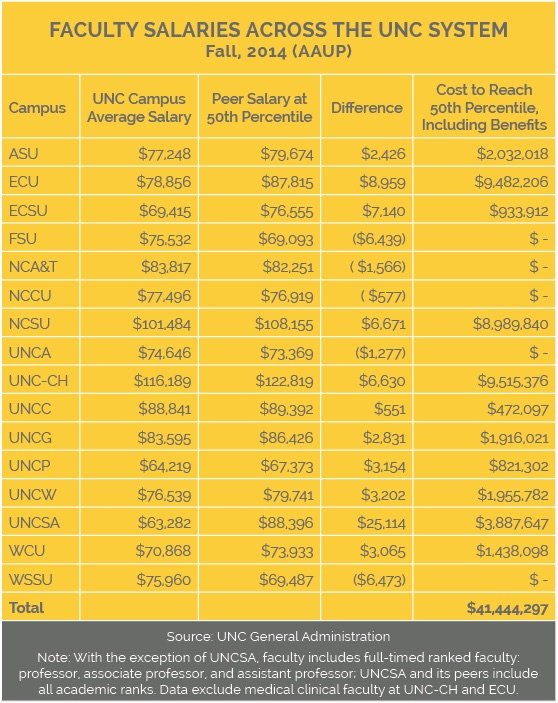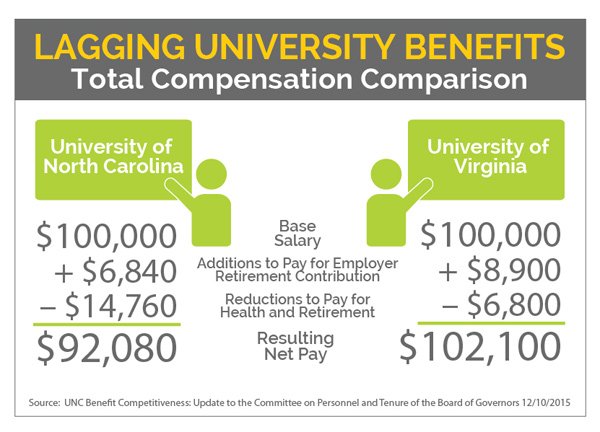RALEIGH – We agreed last week to invest in physical capital for North Carolina’s public universities and community colleges, approving $2 billion in bonds by a 2-to-1 margin.
Now it’s time to invest in human capital as well.
When state legislators return to Raleigh next month for their session to adjust the state budget, they need to reward the folks who teach our kids – at every level.
We already know North Carolina ranks 42nd in the country for K-12 teacher pay, and 46th in per-pupil spending.1
A report this month to the UNC Board of Governors found that 11 of the state’s 16 public universities also fall below the 50th percentile for average faculty salaries compared with their peer institutions.
Faculty at flagships UNC-Chapel Hill and NC State University would need a raise of roughly 6% just to reach the 50th percentile.2
Meanwhile, 76% of faculty members who received outside offers from 2012-14 accepted those offers. Of 320 faculty across the system who left during that period, 93 took $91 million in grants with them.3
Legislators have granted university faculty just one raise in seven years. This year they received a $750 bonus, which did nothing to increase base pay.
Salary differences are only part of the story – benefit costs are higher for North Carolina university faculty as well. A UNC professor pays more than twice as much for health insurance as a colleague at the University of Virginia.4
The Board of Governors appears to be preparing to ask legislators for $58 million to provide a 2% raise for faculty.5 The data support a raise of more than 2% – especially when other institutions will no doubt continue raising pay.
Margaret Spellings, the new President of the UNC system, gets it.
“Pay is a priority for me in this budget session, period,” Spellings told the Faculty Senate at Western Carolina University last week. “If we lose that advantage, we really undermine what we do as an institution.”
Spellings said getting “some kind of decent raise” is her “top priority” in the legislative session that starts April 25.6
“Salaries have been stagnant in the UNC system for years, and faculty are beginning to make career decisions accordingly,” the Smoky Mountain News reported.
“There’s going to be massive losses of talent and major inability to draw new people like we have historically been able to do,” David McCord, chair of the WCU Faculty Senate, told the newspaper.7
Spellings made similar remarks Tuesday at UNC-Chapel Hill.
“We need to invest in and cherish these institutions – our faculty, the people who are innovating and especially, of course, our students,” she said.
“Staff and faculty pay is clearly an issue that’s before us in the legislature. We’re really at a tipping point to remain competitive in this country, and we need to invest in great people.”8
Similarly, the State Board of Community Colleges is seeking a 3% raise from the legislature this year for community college employees.
Average faculty salaries at NC community colleges rank 11th among 16 Southeastern states. The NC average salary of $47,400 equals only 90% of the Southern Regional Education Board average and 81% of the national average, according to the 2015 SREB Fact Book.
The Board says an additional $24 million would help North Carolina surpass the average in South Carolina and catch up with Tennessee.9
But North Carolina doesn’t compete just with neighboring states. We are engaged in a global competition for talent.
So yes, we need to reward the folks who teach our kids – at every level.
1 http://www.wral.com/nc-still-lags-in-teacher-pay-student-spending/14522762/
2 http://www.higheredworks.org/2016/03/faculty-salaries
3 “Faculty Retention Efforts, July 2012-June 2014,” UNC General Administration.
4 http://www.higheredworks.org/2015/12/lagging-university-benefits/
5 http://www.northcarolina.edu/apps/bog/index.php?mode=browse_premeeting&mid=5630&code=bog, Committee on Budget and Finance, Item 2.
6 http://www.smokymountainnews.com/news/item/17306-new-unc-president-promises-to-fight-for-higher-salaries-engage-wcu-faculty-on-policy
7 Ibid.
8 http://www.newsobserver.com/news/local/education/article67620627.html
9 http://www.nccommunitycolleges.edu/sites/default/files/state-board/finance/fc_04_2016_budget_priorities.pdf



Rich says
If you think that faculty have it bad try being a staff employee at one of these universities. EPA and Faculty usually get a raise of some kind every year and it’s almost unheard of to get more than a 2 percent increase for staff or we get vacation time which may or may not help an employee. Without us faculty would not be able to function and yet all I hear every year is how bad faculty have it. Well your not the only ones and some of us are even worse off than you are. Do a study on us and see what you find.
Dr. Jane S. Gabin says
It’s great that some attention is finally being paid to these issues. What if the legislators refuse to grant appropriate raises to our teachers? VOTE THEM OUT OF OFFICE! And then teachers themselves, from K-12 through university, must band together and strike if necessary. That’s what North Carolina deserves for banning collective bargaining among its employees.
Peter Watson says
Improving our educational system is a long term investment that provides huge returns over time. We can’t think in terms of “right now” results. Unfortunately we’ve had some legislators who aren’t thinking beyond the next election cycle, let alone 10, 20 or 30 years down the road.
In the 20th century, North Carolina made significant investments in its educational system and its highway infrastructure that lifted it above other states. Republicans and Democrats alike had a progressive perspective and worked together to make NC the “good roads state” and to create one of the best university systems in the country, with schools renowned in the arts, liberal arts, engineering, agriculture, textiles, math and other sciences.
Now both are in jeopardy. We’re getting toll roads and education has been neglected across the board.
The positive benefits of a strong educational system accrue over time, as students progress through it. Likewise, the negative impact of neglect takes time to become evident. A few years ago a North Carolina legislator justified an education budget cut because test scores were good. He didn’t see that it took years of quality education for students to achieve those test scores.
Now we’re near the bottom of the barrel for K-12, and losing ground in higher ed. We have faculty and staff recruited right out from under us. A UNC doctor I had – a leader in his field – was recruited by Ohio State a year or so ago. He wasn’t looking, they came after him. UNC couldn’t match, let alone beat, the offer. Our loss, their gain.
Same thing happens to our Information Technology staff. Our dedicated, smart, hard working tech people get offers from the private sector they’d be crazy to pass up. We had a Windows server admin recruited out from under us. He wasn’t looking for a new job either, but by taking the offer, his pay went up 25% and his family health insurance premiums went down by $6,000 a year. He’s have been nuts to pass it up.
Meanwhile, our K-12 teachers graduate from our colleges full of enthusiasm, eager to teach our kids. They burn out after a few years of 50 plus hour weeks, scant resources to meet increasingly demanding expectations, minimal respect for their very difficult work and to top it off, lousy pay that ranks near the bottom for the whole nation. I’m working on a Master’s degree, and half the students in my program are former classroom teachers, changing careers. The stories of the stuff they’ve had to deal with, and how their joy of teaching was crushed by it, are heartbreaking.
We, the people, are the ultimate losers in this situation. You get what you pay for. We either invest in the future, or we don’t. Either way, we reap the harvest of what we’ve sown.